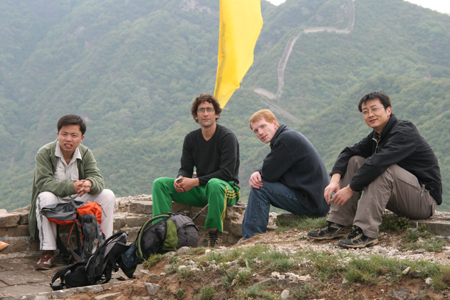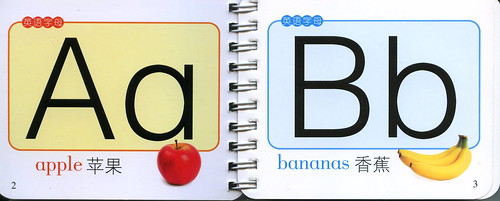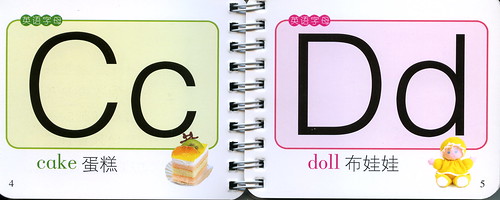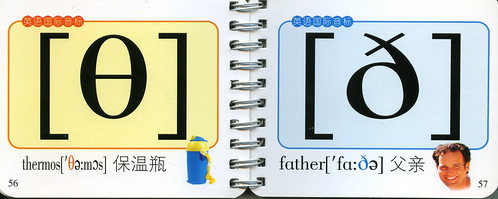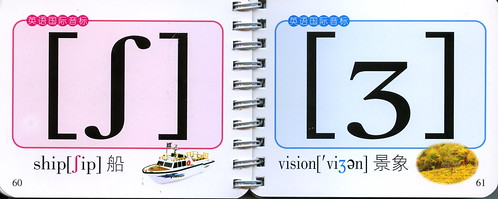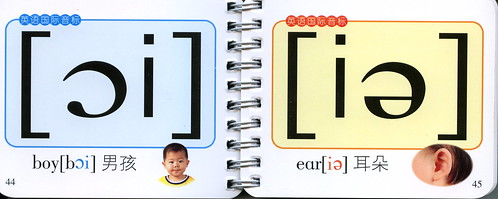27
Dec 2008Brad Ferguson's Bamboo Guitar
My friend Brad made a guitar out of Chinese bamboo. Behold:
– Building the Guitar (Part 1)
– Building the Guitar (Part 2)
– The (mostly) finished guitar being tested out:
– The Finished Guitar (photos)
Brad is involved with Tonerider, which “produces electric guitars pickups, bass guitar pickups and handwired guitar effects pedals, designed and priced for working musician.”
21
Dec 2008Dog VS Cat, plus Thoughts
Recently discovered this hilarious video on Youku. Be sure to watch it to the end.
The video appears to be from Taiwan.
This got me thinking… “funny animal videos” (along with “cute baby videos”) belong to a small set of video types which has universal appeal. If you watch funny animal videos on Youku, you’ll notice that most of them come from outside China, and were simply “ported to” (copied and uploaded to) Youku. Obviously, it could go the other way as well, but for now, that’s less common. Why aren’t more “funny animals videos” from China?
Well there are a number of reasons… Household pets are not as common in China yet, and video equipment may not be quite as prevalent (although it must be getting close!). As these two increase, you can reasonably expect the filming of pets to increase, and with that the number of funny animal videos coming from China.
So I wonder… how long do we have before the majority of these videos come from China?
18
Dec 2008Interview on Lost Laowai
Ryan of Lost Laowai recently interviewed me for a series he’s doing. He asked some good questions.
14
Dec 2008Black English and Chinese
I was helping a Chinese friend with her English, and was very interested to read the following dialogue in her book. (I have preserved the grammar and punctuation of the original, but I didn’t feel like writing “[sic]” everywhere.)
The dialogue:
> A: Your English is not like American English.
> B: Oh, I see. What I speak is true American English, but it is not standard American English.
> A: What kind of English is it?
> B: It is Black English.
> A: What is Black English?
> B: Black English is as perfect as Standard American English, and in sounds it is equally distinctive.
> A: Can you tell me the difference between Black English and Standard American English?
> B: Black English is similar to Chinese in a way.
> A: Is it like Chinese?
> B: Yes. For example, a Chinese said, “我有5分钱”, there is no -s behind “钱”; an English or an American said, “I have five cents.” After “cent” there is -s; the Black English is “I have five cent”, no -s after “cent”. Another example, a Chinese said, “花红”, an American said, “the flower is red”, but the Black English is “The flower red”.
> A: Oh, I see.
The textbook is called 衣食住行生活英语900句. If I remember correctly, this was Dialogue 1 of five in a chapter called “Learning a Language.”
What a bizarre topic to cover in a book supposedly focused on “useful English.” You only have so much content you can cover in the book, and only a small fraction of that is devoted to talking about language, but you kick off the chapter with a discussion of (morpho-)syntactic similarities between AAVE and Mandarin Chinese??
I’m well beyond being outraged about inferior English textbooks, though. In this case, I have to admit that it’s kind of cool from a cultural standpoint. I’d imagine that the average Chinese person is seldom exposed to such egalitarian linguistic concepts.
10
Dec 2008Toward Better Tones in Natural Speech
At ACTFL 2008 one of the presentations on TCFL that I found most interesting was one called “An Alternative Way to Teach Mandarin Tones in Speaking” by Dr. Rongrong Liao of the Defense Language Institute.
The problem, as Dr. Liao presented it, is that many learners can reach a relatively high level of fluency in Mandarin Chinese, have excellent tonal accuracy for individual words, yet still make a large number of very unnatural tonal errors in natural speech. This is a common enough problem that educators really need to be looking for ways to address it.
The message of the presentation was, in essence:
- We’re giving students of Chinese the wrong picture of tones (third tone in particular)
- Tones are not of equal importance in natural speech
- Funny-sounding speech can be corrected most efficiently by focusing on certain key tones
Now I’ll break these different points down one by one.
We’re giving students the wrong picture of tones
The way students first learn tones is in isolation. You apply tones to individual syllables. The idealized tone contours of those tones in isolation look like the chart below.

The thing is, in natural connected speech, tones don’t behave quite that way. Yes, there’s tone sandhi (tones in sequence affect each other in regular ways), but it’s more than just that. Third tone in particular has a habit of dipping but then not rising the way it should. (This phenomenon is known as the “half-third tone.”) So then is the not rising in natural speech the exception, or is the perfect rise in an isolated tone the real exception?
Dr. Liao suggests that it’s more useful to teach that the third tone is low rather than dipping. This could help with third tone problems in connected speech. The “model” third tone with a rising tail could then be treated as the exception to the rule.
The symmetry-loving perfectionist in me actually likes this a lot. This way you end up with two pairs of almost diametrically opposed tones (yes, we’re fudging a bit): high vs. low (1 vs. 3), and rising vs. falling (2 vs. 4). Dr. Liao also notes here that learners tend to confuse tone 1 and 4 with each other much more than with the other two, and tone 2 and 3 much more than with the other two. Very interesting.
This really struck a chord with me, as it matches nicely with my own observations. Taking all this into account and putting the actual tone contours aside for a moment, I put together my own experimental “idealized perceptual tone diagram”:
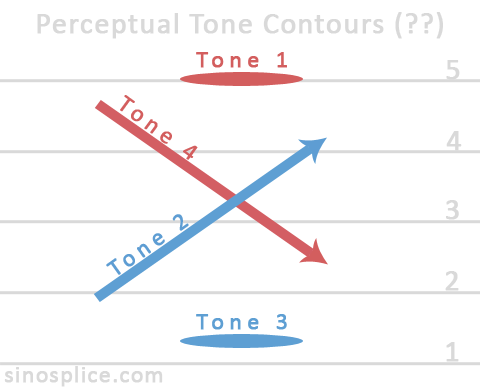
I have no idea if a representation like this could actually be useful to any students. Before you freak out by such a concept, though, let’s move on to the next point…
Tones are not of equal importance in connected speech
When Dr. Liao started talking about this, I had an immediate flashback to something my friend Alf said after studying Chinese in China for about half a year:
Tones are such bullshit. When Chinese people talk really fast, they don’t really use them. So I’m just going to ignore them and talk really fast like Chinese people, and I’ll be fine.
Ah, the “tones aren’t important” fallacy. Most students of Chinese have heard such sacrilege more than once in their long years of study, I’m sure. The thing is, like any good lie, there’s actually some truth to it.
Dr. Liao pointed out that in natural speech, some tones in a “frame” are “weakened” or “reduced” and lose many of their “idealized” properties. That is to say, if you look at their tone contours (remember how to do that with Praat?) in the sentence, they don’t all resemble the perfect angles in the classic chart we all know so well.
Here’s an example of what native speaker tone contours look like in speech [source]:

You’ll notice that the tones of some words are clearly recognizable, while others are less so. What’s going on? Well, in natural Chinese sentences, certain words in each phrase are stressed. Stressed words will have a tone contour which most closely follows the idealized form, whereas the other tones are shortened, kind of run together, and generally goof off.
Funny-sounding speech can be corrected most efficiently by focusing on certain key tones
Here’s where Alf’s idea comes into play. Dr. Liao recommends that instead of correcting every mispronounced tone in a sentence (and there might be many), instructors should focus on the stressed words. When the tone(s) in a stressed word is mispronounced, the sentence will frequently sound quite bad to native ears, but when the stressed word is pronounced correctly, the other tones will often fall in line.
This is a cool idea, because if it works, it means (1) teachers can stop worrying about so many wrong tones, and (2) students can quit freaking about every tone.
Sounds good to me. It’s complex enough!
04
Dec 2008English Essay Templates
You’ve probably heard that tests are a big deal in China, and thus test prep is big business. This applies even to such “un-gameable” forms of tests as free response essay questions. But how do you game the free response portion of an English test?
Well, you memorize a number of essay templates, then just fit your essay answer into one of the templates. All you have to do is plug in a few relevant words and phrases, and with any luck, they’ll all be included in the essay topic.
Curious what these templates might look like? I give you two examples below, taken from an MBA prep course in Shanghai (mistakes preserved):
> Essay Template 1: 优缺点类
> At present, there is no doubt that 主题 plays an increasingly indispensable role in 领域/运用范围. We are all aware that, like everything else, 主题 has both favorable and unfavorable aspects. Generally speaking, the advantages can be listed as follows. First of all, (优点1)… makes people’s everyday life more convenient. In addition, (优点2)… connects its users with the outside world. Most importantly, with a…, (优点3) people’s life will be greatly enriched.
> Nevertheless, it is a pity that every medal has two sides and the disadvantages of 主题 can’t be ignored. To begin with, there will be a danger of (缺点1) spending too much time on it therefore ignoring what you should concentrate on. To make matters worse, (缺点2)主题 is most likely to add to your daily expenses. Worst of all, (缺点3)主题 may plunge you into an unexpected trouble.
> As is known to all, 主题 is neither good nor bad itself. Its effects on people depends, to a large extent, on how 主题 is used. Now that the disadvantages have been put out, they will be paid attention to and eliminated to some degree.
> Essay Template 2: 意义影响类
> We are very glad and excited that our dream of 主题 will come true/ have come true after a long waiting. People throughout the country have been celebrating the coming of 主题 in various ways and they are eager to participate in or experience in … person.
> There is no doubt that 主题 will benefit China and Chinese people in more than one aspect. First of all, 主题 will expose China and Chinese to more domestic and foreign visitors, thus promoting the mutual understanding and friendship between people from different regions and cultures. More importantly, by interacting with people from different regions and cultures, people can learn from each other. Finally, 主题 will undoubtedly promote the development of the national and local economy.
> Now that 主题 is significant to our country and the people, everybody involved should make his effort to contribute something to 主题. With everyone’s involvement and participation, 主题 will be a great success and is bound to benefit the country and the people involved.
Somehow those “generic” topics don’t seem totally generic, do they? The templates above definitely used “topics with Chinese characteristics,” and they should certainly come to no surprise to anyone who’s lived in China in the past year.
Can you imagine grading hundreds of these essays that mostly use the same templates? That would drive me insane.
For those of you that find some morbid amusement in these essay templates like I do, here’s one site that hosts more of them online. There are some slight differences in wording between the ones I have in front of me and that site, but they clearly came from the same source.
30
Nov 2008Back from ACTFL (2008)
I had a great time interacting with other teachers at ACTFL 2008. Yes, what we do at Praxis Language is quite different from what the teachers in the trenches do, but it’s important to connect with them, to hear about how the classroom is changing, how the students are changing, and maybe even about how we might converge in some areas.
I sat in on some particularly interesting talks on CFL (Chinese as a Foreign Language). Only half a year after I finished my own thesis, I felt I really needed to be reminded of the wide world of academic pursuits… some of the research was quite fascinating. I’m planning to revisit some of the topics here in my blog in the next few weeks.
In the meantime, I’d just like to draw my readers’ attention to a cool product I ran into at ACTFL: Skritter [China-friendly link]. It’s a really well-executed online system for practicing character writing, and it has built-in support for Integrated Chinese. Check it out.
16
Nov 2008ACTFL, here I come!
This year Ken Carroll and I will be representing Praxis Language at the ACTFL 2008 Convention in Orlando, Florida.
I’m really looking forward to meeting some of the brightest and most passionate language educators that my country has to offer. If you will be in attendance and would like to meet up, by all means, send me an e-mail.
03
Nov 2008Remember that thesis thing?
I announced way back in May that I passed my master’s thesis defense, and I promised to write more about it, but you’ve seen very little about it here. Why? Let me explain.
First, once the thesis was over, all I wanted to do was breathe a sigh of relief and forget about the thesis for a while. I was in no big rush to blog about the content of my thesis.
After my thesis was behind me, I became much more caught up in work. I found it hard to find good blocks of time to devote to putting my thesis findings on my website. The procrastination that served me so well in the early days of my thesis work had returned to help me out with the thesis website aftermath.
I had long planned to do it all over the October holiday, but laziness and a few days of flu destroyed that plan. It’s much easier to do quick one-off blog posts than to dig back into my research, so it has remained untouched.
Realizing that it will never happen if I don’t put forth a more determined effort, I have decided to put time aside to work on it instead of blogging. So I won’t be blogging at all until I finally get my thesis experiment results up on my website. I expect to finish it this coming weekend (November 9ish).
What you can expect:
– A new item in my Language section devoted to my thesis
– An overview of the experimental procedure
– An overview of the results
– A blog post or two discussing various aspects of the process
I’m not sure whether I’ll put the actual full thesis up for download. I’m definitely not translating the whole thing, but I might put it up in its original Chinese. The only problem is that a data error was identified after I completed my thesis, so if I do put it up, I’ll want to put up a corrected version. That will take more time. We’ll see.
Nov. 10 Update: Taking longer than I expected. (Forgot I don’t have MS Office 2007 on my computer right now, which I need…)
Nov. 16 Update: I’m running into some MS Office-related problems, but more importantly, I have to prepare for a business trip, so this project is going to have to be put on hold again.
29
Oct 2008Black Toothpaste Video
I was searching Youku for interesting Chinese videos about Obama, but all I could find were a few CCTV news clips. If only average Chinese young people liked to video themselves talking about all sorts of topics and put it online, like American kids do on YouTube!
In the process, I ended up doing a search for 黑人 (“black person/people”). Most of the search results were rap or hip hop or dance related, but there was one bizarre one that stood out:
It’s not even Chinese (not related to “Black Man Toothpaste“); it looks like Thai to me. Apparently the Chinese have no monopoly on bizarre/offensive use of black people in toothpaste advertising.
27
Oct 2008The Great Firewall of China: Coming to a Browser Near You
Now anyone can have the frustration of the Great Firewall of China in the comfort of his own home, thanks to the China Channel Firefox Add-on:
> The Firefox add-on China Channel offers internet users outside of China the ability to surf the web as if they were inside mainland China. Take an unforgetable virtual trip to China and experience the technical expertise of the Chinese Ministry of Information Industry (supported by western companies). It’s open source, free and easy.
Via TechCrunch.
27
Oct 2008Danwei and Sinosplice on US-China Today
Yao Xu has written an article for US-China Today titled Expatriate Blogs: An Online Community. For me, one of the highlights of the article was this photo:
At first I thought it was just a random picture of some backpacking foreigners visiting the Great Wall, but then I recognized that red head of hair and that big curly head of hair. It’s a (rare?) group photo of some of the members of Danwei.org! (Left to right: Eric Mu, Jeremy Goldkorn, Joel Martinsen, Banyue.)
There’s also a Sinosplice-related quote from me in there:
> Pasden poked fun at some of China’s issues in the humor section of his blog, “A Pictorial Guide to Life in China.” On a serious note, Pasden says that he has gradually come to an understanding with the country and its problems.
> “Over time I’ve gotten a bit more sympathetic to the Chinese situation,” he said. “The truth is that taking care of 1.3 billion people and their environment at the same time is a mind-bogglingly difficult task. So while it’s true that China is still pretty dirty compared to the West, I don’t make fun of the problem like I used to. As a semi-permanent resident, it’s my problem too. I breathe this air and drink this water.”
Ah yes… I’m kinder and more sensitive now (but my lungs are dirtier).
23
Oct 2008IPA for Chinese Children
Teaching children English is important in countries all over the world. China is no different. Here are some scans from a little book designed to help teach Chinese children the alphabet:
And once they’re done with that, why not teach them the international phonetic alphabet (IPA) as well?
Yikes!
21
Oct 2008Getting by and Enjoying It
A little story from much-loved ChinesePod user AuntySue:
> In hospital I ran into a few Cantonese speaking patients and visitors, who in some cases spoke no English. With the luxury of ample time, I was able to say things I don’t really know how to say, by finding inventive ways to use the few words I did remember. For example, instead of asking if she’d mind opening my water bottle top because my hands were too weak and the cap is tight etc etc, I simply asked “please, can you?” and held the bottle at the top. Worked like a charm. But I’d spent half an hour agonising over the words before accepting that a simpler method was not “cheating” but rather “communicating”.
> When learning a language I too often make it hard for myself by fixating on the words I don’t know rather than finding more uses for the words I do know. Lesson learned. I got my water, the “it’s a talking dog!” look, and a new friend.
Dr. Orlando Kelm, a man of impressive linguistic ability, recently made some related observations:
> My general impression is that people would enjoy foreign languages more if they didn’t have the added pressure of feeling like they are supposed to be equivalent to native speakers. You will notice that our educational system promotes this viewpoint too. We generally teach foreign languages as if learners are somehow going to be total experts some day. (Why else would we spend weeks teaching third semester college students about all of the adjective clauses that trigger the subjunctive in Spanish?) My general impression, however, is that the majority of our learners do not need to speak like undercover spies. They would be just as happy having a great time talking about sushi with Japanese friends in Japanese.
Hear, hear!
I often wonder how good I want my Chinese to be. I have lots of room to expand my vocabulary and improve my ability to express myself, but there are two big questions: (1) do I really need to? and (2) do I really want to?
I’ve gotta say, an unrelenting drive for perfection isn’t exactly the most persuasive linguistic motivation, and the longer I live, the more practical I become. The truth is, I’m not a terribly talkative person, and I’m already pretty comfortable in Chinese. I don’t want to be a Chinese spy (ha!), and I really don’t want to memorize the damn chengyu dictionary. I’d rather get my Spanish and Japanese back to levels where I’m more comfortable and able to enjoy the experience of speaking.
Yes, I think I’ll do that.
19
Oct 2008The Death of Handheld Electronic Dictionaries?
Steven J wrote me with this question:
> I have been in china for two years and always used paperback dictionaries or the one on my computer. However, now that i will start studying it seems more handy to have one of these pocket size electronic dictionaries. However it seems that all of these machines have a pinyin function for INPUT only. When looking up a word in english, it only gives you characters. This is quite a pain in the ass for someone like me who can speak some Chinese, but is almost illiterate. Do you have any advice on where to find one of these gadgets that would suit my needs better or can you redirect me to a good place to find information on this topic?
I went through this exact same dilemma when I first arrived in China. I had my handy Oxford Concise English-Chinese Chinese-English Dictionary
which I took everywhere. I noticed the Chinese students all had these little handheld electronic dictionaries, and I wanted one to help me with Chinese. But they really don’t help you a whole lot when you have no way to look up the pinyin for the characters that appear.
I had a Canon Wordtank to help me get through my Japanese studies, and it was great. Designed for the student of Japanese, it provided a “jump” feature which made it easy enough to look up the readings of any word even if the readings weren’t directly displayed everywhere. It got me through my last two years of formal Japanese study, which involved a lot of reading and translation.
But for Chinese? I’ve seen some really cool dictionaries that essentially do what the Wordtank does, but for English, Mandarin, Cantonese, and Japanese. With audio. They’re not cheap, though.
I never found a reasonably priced handheld Chinese electronic dictionary that did what I want. I ended up jotting down words and looking them up at home on Wenlin or online.
The heyday of these little handheld dictionaries is coming to an end. I know several people that use their Nokia cell phones for all their English-Chinese dictionary needs. New dictionary apps for the iPhone abound, and the iPhone already has great handwriting recognition support for Chinese built in. Google’s Android is sure to have no shortage of dictionary apps; maybe even official Google Translate dictionary functions.
If you’ve made it this far without a handheld electronic dictionary, then you should just hold on a little longer. The days of single-function handheld electronic devices are numbered. I, for one, wish this new generation of handheld devices would move in for the kill a little faster.
15
Oct 2008chinaSMACK
By now, many of my readers are well acquainted with a relatively new blog called chinaSMACK. It’s kind of like “EastSouthWestNorth Lite,” in that it takes Chinese media and translates it to English for a foreign audience, but stays away from the heavy political topics.
Here’s an excerpt from the chinaSMACK manifesto:
> I decided to make this website and share a “slice of Chinese life” with English-speaking foreigners. I will collect and repost all of the hot, popular, interesting, outrageous, and shocking things that I see on the Chinese-language internet so foreigners can understand, experience, and enjoy also. Maybe there will be some cultural differences and maybe not every foreigners will understand what Chinese think is funny, sad, angry, or ridiculous but I will try to translate and explain the “cultural context.”
> No politics! I will not talk about politics. I do not want to. It is too serious and not fun. Other people can do that if they are bored.
> I just want to show a piece of the real China, real Chinese life, and real Chinese people. I want to show our beautiful side, our fun side, our sexy side, and even our ugly side. No one is perfect, everyone makes mistakes, does bad things, and hurt other people sometimes. Chinese people can be serious and Chinese people can be silly too. We love and we hate. We have dreams and we have fears just like everyone else. We have sex and we fight too. Even if we are from different countries and different cultures, everyone laughs and everyone cries. I hope my website will help foreigners realize that Chinese people are very similar to them and not so different.
If you’re unfamiliar with chinaSMACK and the above sounds good to you, take a look.
13
Oct 2008Syntactic Anguish of the Verb-Object-Modifier Variety
你中文说得很好! You speak Chinese very well.
This is a compliment paid nearly every person with the guts to try out his spoken Mandarin skills in China. All you gotta do is try.
But the simple sentence above contains a grammar pattern which students of Mandarin Chinese take quite some time getting the hang of. Translating word for word, a beginner student will take this English sentence:
You speak Chinese very well.
…and render it as this sentence:
×你说中文很好。
Unfortunately, in Mandarin Chinese this sentence is ungrammatical. This pattern, fine in English, is all broken in Chinese:
×Noun + Verb + Object + [Modifier of Verb]
There are two solutions to this brokenness in Chinese:
#1 Repeat the Verb
That object between the verb and its modifier breaks a sacred connection. You can’t do it. But while you can’t break the connection, you can simply duplicate the verb:
你说中文说得很好。
Noun + (Verb + Object) + (Verb + [Modifier of Verb])
Voila! Connection preserved. You just have to get used to duplicating the verb, which, to a speaker of English, seems mighty unnecessary.
#2 Move the Object
As mentioned above, you can’t break the sacred verb-modifier connection. So why not move the object? This totally works, and it’s usually moved to right after the subject:
你中文说得很好。
Noun + Object + (Verb + [Modifier of Verb])
This is just really awkward for a beginner student. Why do you have to put the object before the verb? It seems really weird. Well, you don’t have to. You can also duplicate the verb. But that feels awkward too.
This pattern is so common, however, that it cannot be ignored. The more input the student gets, the more he sees that (a) Chinese people just don’t say it the way I really, really want to say it, and (b) Chinese people use these other two sentence patterns instead. It seems to me that given the choice between the two awkwardnesses, this is how the linguistic drama tends to unfold over time:
- Broken sentences following the forbidden pattern
- Experimentation with the verb duplication workaround
- Attempts to use the verb duplication workaround exclusively
- Reluctant acceptance of the object-movement workaround
- Relative verb-object-modifier harmony
These are just my own observations, but apparently the verb duplication seems easier, while the object moving is actually more common in the casual Chinese of native speakers (although both are common).
How about you? Are you in the midst of this syntactic anguish? Do you remember being there once?
12
Oct 2008Baidu's Bad Behavior
I wrote a while back about how to download music through Baidu’s MP3 search. Since then, Baidu has taken some heat, and downloads from overseas are no longer allowed (but it still works fine in China).
In the past couple months, Baidu has been accused of a lot more than just indexing copyrighted music that’s already online. The alleged sins include:
– Bullying other sites to take down any negative publicity about Baidu (the implicit threat: taking a big fall in Baidu’s rankings if you don’t comply)
– Using superior technology to secretly host the MP3 files it indexes and hide the evidence
– Moving files from server to server to “comply” with take-down demands while the MP3s stay comfortably downloadable from Baidu’s index
Yikes. “Don’t be evil” is looking pretty good right about now. Read more about this here (contains links to other sources).
08
Oct 2008The Toilet Paper Excuse
My friend Sean has a hilarious post up about cultural differences compounded by generation gaps in China. This particular drama revolves around toilet paper. Here’s an excerpt:
> By the time the night was finishing up and the massage was over, it was quite late, around 10:30pm. The parents live in a slightly remote part of Shanghai, only accessible by bus or taxi, and they always refuse to take a taxi because its too expensive (even if I offer to pay). I told JJ to tell them to just stay the night at our house, that made the most sense and it was totally fine by me (and of course by JJ). We do have an extra room and I did buy this couch bed for this very reason. So it only made sense for them to stay, especially since it was holiday and JJ was not working.
> Here comes the kicker. They were at first totally against it. Why, you might ask? Well it was not for the normal reasons you might imagine, such as ‘we don’t want to intrude’, ‘we have plans tomorrow morning’, we simply want to get home’, ‘we don’t like the couch bed’. None of these things mattered to them. Instead, the issue at hand was literally:
> We don’t know if we want to stay because the toilet paper I buy is too soft for them and they really don’t like using it.
Read the rest of the post for Sean’s reaction.
The type of “toilet paper” the parents prefer is called 草纸 (literally, “grass paper”), although it’s sometimes just referred to as 手纸 (which, amusingly, are the same two characters used to write the word for “letter” in Japanese).
I used to use 草纸 as paper towels back in the day. I tried to find a decent picture of it online, but this was the best I could do.


